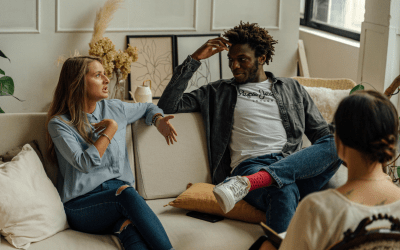
The Important Role of Community Care in Black History
By Mallak Tartir
This post may contain affiliate links, which means we may receive a commission, at no extra cost to you, if you make a purchase through a link. Please see our full disclosure https://sagecounselingtherapyandwellness.com/disclosure-privacy-policy-terms-of-use/ for further information.
June marks the presence of many different occasions; however, it also brings to light the struggles that present themselves throughout history and the overcoming of those struggles. More specifically, Juneteenth (observed annually on June 19th) is a holiday that commemorates the day in 1865 when the last enslaved African Americans in Galveston, Texas, learned of their emancipation, over two years after the Emancipation Proclamation had been signed. More than a historical milestone, Juneteenth serves as a powerful cultural and emotional touchpoint for reflection, celebration, and healing. It honors the long and ongoing journey toward freedom for Black Americans, not only in the legal or political sense but also in psychological, spiritual, and emotional dimensions.
What Is Community Care?
In the wake of generational trauma caused by slavery, segregation, redlining, systemic racism, and continued violence, healing in Black communities has often taken a collective form. Community care (a term that refers to people caring for one another through mutual support, shared responsibility, and cultural practices) has been a central, life-sustaining force throughout Black history. It represents a model of survival and resistance, where wellness is not a solitary pursuit but a shared one.
This blog explores how community care has historically supported Black mental health and well-being, how it continues to evolve today through mutual aid, healing spaces, and culturally grounded therapy, and how Juneteenth serves as a reminder of the radical power of caring for one another.
Historical Foundations of Community Care
The trauma of slavery cannot be overstated. Enslaved Africans were forcibly taken from their homelands, stripped of their languages, cultures, and families, and subjected to inhumane conditions. Under such brutality, traditional Western mental health care was nonexistent, and institutional support was hostile or entirely absent. Instead, enslaved people created their own systems of care, which we might now recognize as community care.
These systems took many forms. In the absence of medical treatment, Black midwives, herbalists, and spiritual leaders provided physical and emotional healing. Elders shared stories, songs, and rituals to preserve cultural memory and pass down resilience strategies. Music, especially spirituals and work songs, became emotional outlets and forms of coded communication. These expressions provided comfort, preserved identity, and cultivated solidarity.
One historical example of community care is the creation of mutual aid societies. As early as the 1700s, free Black communities began forming organizations to support each other through sickness, unemployment, and death. The Free African Society, established in 1787 in Philadelphia by Richard Allen and Absalom Jones, was one of the first such societies. It assisted widows, orphans, and the poor, offering a network of social and emotional support that governmental and white institutions refused to provide.
The Black church also emerged as a central institution of communal care. More than a place of worship, it served as a center for education, political organization, and emotional solace. Ministers were not just spiritual leaders but counselors and social workers. Through church networks, Black communities created scholarship funds, housing cooperatives, food banks, and mental health support, long before such services were available elsewhere.
Community Care in the Present Day
Today, many Black communities still face significant barriers to accessing mental health care, including stigma, lack of culturally competent providers, underinsurance, and historical mistrust of the medical system. According to the American Psychiatric Association, only one in three Black adults who need mental health care receive it. However, the tradition of community care continues to thrive in new and transformative ways.
One powerful example is the work of The Okra Project. This collective provides meals and wellness resources to Black trans and non-binary individuals, many of whom face compounded marginalization and trauma. Their services include therapy funds and holistic support that validate both identity and experience. This is more than charity, it’s mutual aid rooted in love, dignity, and survival.
Safe Black Space, another initiative born out of grassroots organizing, offers healing circles specifically for Black individuals processing racial trauma. These circles are led by trained mental health professionals and community leaders who integrate African-centered practices. Participants engage in group dialogue, guided breathing, and storytelling, reclaiming their emotional wellness in a space where their pain is understood and shared.
Similarly, Therapy for Black Girls, a platform founded by Dr. Joy Harden Bradford, provides a directory of Black women therapists, educational resources, and a podcast that makes mental health more accessible. What makes platforms like this powerful is that they normalize mental health care while centering the cultural realities of Black womanhood.
These modern expressions of community care honor the same principles that underpinned survival during slavery: collectivism, shared responsibility, and love. They offer culturally congruent spaces where people can process pain, celebrate joy, and feel seen. They also remind us that healing doesn’t happen in isolation; it happens in relationships.
Taking Action: How to Support Community Wellness
Honoring Juneteenth through the lens of wellness means taking intentional steps to support community care. First, we can engage in local mutual aid efforts. These are grassroots collectives that pool resources and redistribute them according to community needs. Whether it’s through volunteering, donating, or organizing, mutual aid strengthens community bonds and offers direct support to those most affected by inequality.
Second, we can support Black-owned wellness businesses. These include therapists, yoga instructors, herbalists, and creators of healing products. Shopping through curated collections like Rachel’s Amazon Storefront, which features books, journals, teas, and self-care tools by and for Black communities, is a tangible way to invest in Black wellness.
Third, we can advocate for culturally competent mental health services. This includes demanding better representation in the mental health field, funding for community-based health centers, and the integration of African-centered healing practices into mainstream mental health care.
Lastly, we can start conversations. Talking about mental health in our families, friend groups, and workplaces breaks stigma and invites vulnerability. Creating space for others to share and feel supported is itself a form of community care.
Reimagining Freedom and Wellness
The journey from trauma to healing is neither linear nor individual. It is collective, cyclical, and deeply rooted in history. Community care has always been a core part of Black survival and flourishing, from the hidden spaces of enslaved peoples singing spirituals to the healing circles of today. It affirms that healing is not a luxury, but a right, and not something to be earned, but something to be shared.
As we celebrate Juneteenth, let us not only honor the emancipation of Black bodies but also the liberation of Black minds and spirits. Let us recommit to practices of community care that uplift, support, and heal. Freedom, after all, is not just the absence of chains; it’s the presence of joy, rest, and collective love.
To discuss how therapy could help you during this season of your life, please contact me or schedule your free 15-minute consultation.
References:
Mental Health America. (n.d.). Community Care. https://mhanational.org/resources/community-care
The Black Wall Street Times. (2024, December 19). Community Care promotes revolutionary healing in Melanated communities. https://theblackwallsttimes.com/2024/12/19/community-care-promotes-revolutionary-healing-in-melanated-communities/
Vita Health. (n.d.). Juneteenth: Honoring freedom and promoting mental health equity in underserved communities. https://www.vitahealth.care/juneteenth-honoring-freedom-and-promoting-mental-health-equity-in-underserved-communities/
The Okra Project. https://www.theokraproject.com/
Safe Black Space. https://www.safeblackspace.org/about-us
Want to read more? Here are a few of my related blog posts you may be interested in checking out!





0 Comments